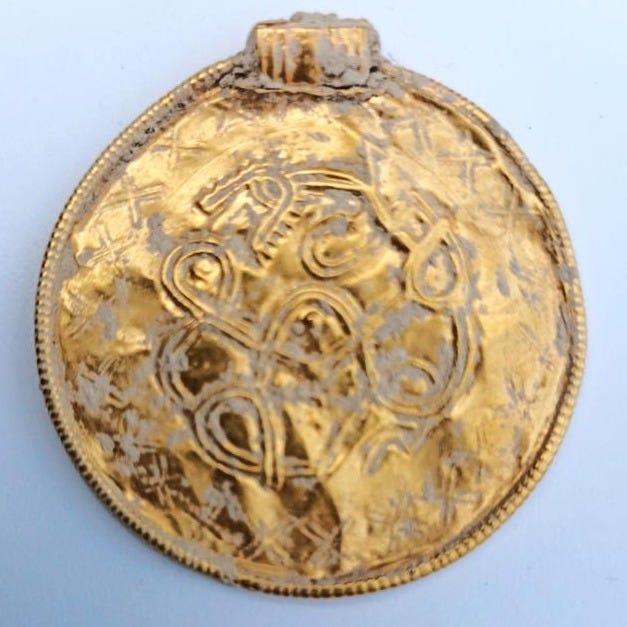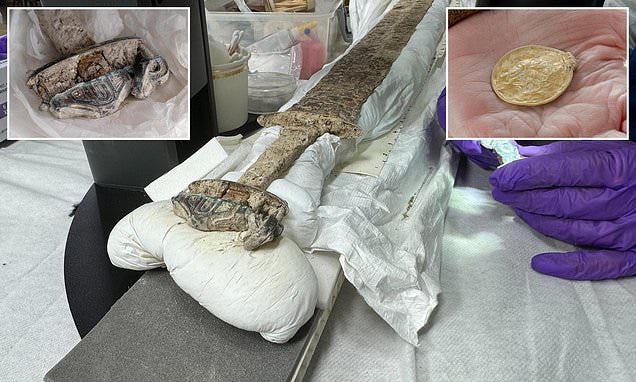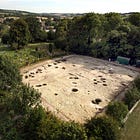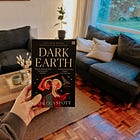In years gone by it was an oft-quoted trope that medieval people coped with the prevalence of untimely death by remaining detached from those around them. Whether it was unborn babies, young children, or lovers, it was said, they didn’t love them quite as much as we love others today, just in case they lost them. Longtime readers of Medieval Musings won’t need to be told what I think of that…
Whispers of Love
A short story in honour of Valentine’s Day

Beornræd1 pulled her in close, kissing her deeply with one hand entwined with her hair, the other holding her waist firmly. He felt Ælfswiþ2 melt into his body, her tension easing momentarily as she surrendered to the safety of his embrace, and he allowed himself to pause a little, his eyes lingering fondly on the trails of hair caressing her face, on the lines that marked so many happy years together. Ælfswiþ smiled weakly, the corner of her mouth twitching upwards as her eyes filled with tears. His, too, filled a little as he kissed her forehead.
Beorhtsige3 ran towards them from the other side of the hearth, clinging to Beornræd’s leg as Beorhtric4 squeezed in between his parents, stood in the doorway of their earthen home. Beornræd and Ælfswiþ laughed as they were forced apart by their children, before Beonræd knelt down to the level of his two sons. He held their shoulders firmly.
“You make sure to take care of your mother while I’m gone, ok? You’re the men of the house now. You need to protect her and the girls. And make sure you help her with the chores - I don’t want to hear that you’ve been lazy when I get back, do I?”
Their little chests puffed up with pride as they looked their father in the eyes and shook their heads.
Beornræd ruffled their hair as they clung onto him once more, willing him to stay.
Ælfswiþ reached into her waist bag and drew something out, pressing it into her husband’s hand.
“Please,” she implored. “Wear it, for me. It will keep you safe - I asked the healer to place a charm on it so that no one can hurt you.”
He smiled softly at her.
“Nothing is going-”
“You don’t know that,” she interrupted, placing a hand on his chest. “You can never know that. Just because nothing has happened yet doesn’t mean you won’t end up like one of them.” She gestured to the burial mounds that crowned the ridge above them.
He looked at her gravely, pressing his lips together in recognition that she was right: without the gods looking over him he could never assure her of his safety during this raiding trip. Too many husbands, too many sons, had ridden out confidently on their horses only to return lifeless on the back of a cart.
He looked down into his hand to find that she had given him her most precious possession, a gift from her mother that had signalled the onset of her womanhood, her readiness to marry him. Laced on a simple leather string, the bracteate pendant was decorated with a twisting snake, mouth open and ready to consume any who crossed its path. Beornræd passed the cord over his head and tucked the pendant away under his shirt, tapping it twice to show her he would keep it safe.
He kissed her again.
“I will return to you, my love. This-” he tapped the pendant once more - “will make sure of it.”
And as he turned on his heel, striding boldly towards his waiting horse, hand on the hilt that bore the symbol of his submission to his lord, the engraved ring that reminded them all that they were not free to choose their destiny, Ælfswiþ crumbled to her knees, sobbing.
She didn’t see the tear roll down his cheek as he mounted his horse.
Historical Note
In years gone by it was an oft-quoted trope that medieval people coped with the prevalence of untimely death by remaining detached from those around them. Whether it was unborn babies, young children, or lovers, it was said, they didn’t love them quite as much as we love others today, just in case they lost them.
Longtime readers of
won’t need to be told what I think of that… And it’s not just me. There is an abundance of written and archaeological evidence that shows this simply to be untrue.Today’s short story, in honour of Valentine’s Day, was inspired by an episode of Professor Alice Roberts’ excellent show, Digging for Britain (I’ll link it HERE in case anyone wants to watch it). Professor Duncan Sayer, of the University of Central Lancashire, presented finds from a recent excavation near Canterbury, Kent, which included those photographed below: a ring-sword and a gold bracteate.

A short historical endnote is not enough space to do this burial justice, so perhaps I need to write a full post on this incredible discovery… Drop a comment if that’s something you’d be interested in!
What is striking about these finds, however, is that we wouldn’t usually expect to find them within the same grave because in sixth-century burials, the sword is primarily an indicator of masculine gender and the bracteate an indicator of feminine gender (read more about gendered Anglo-Saxon burials HERE). Professor Sayer, an expert in Anglo-Saxon burials, suggested that it might represent a gift from a loved one, perhaps an amulet or charm to keep them safe in battle.
And in that suggestion I saw a window into an intimate moment between lovers in the deep past (though, of course, it’s perfectly possible that the gift was between mother and son, or sister and brother). I knew I wanted to recreate that (possible) story, that moment that proved (to me, at least) that historic people did care, dearly, about their loved ones.
What do you think of this discovery? And what do you think about the idea that historic people loved just as fiercely as we do today?
I’m planning a couple of posts in diving further into the archaeological evidence for medieval love, so I’d love to hear your thoughts!
Did you enjoy reading this short story based on a slip of historical evidence? Then you might enjoy these too…
Pronounced beorn-rad
Pronounced alf-swith
Pronounced beort-see-guh
Pronounced beor-tric








Great post! Humans haven't changed as much as we think. The same percentage of people died in medieval times as die today: 100%. Death has always been the enemy, and our hearts have always longed for life and love. I can't imagine that medieval and ancient people loved less -- only that they suffered more from earlier losses. Time-travel with me to 1348 London where I research the Black Death! https://katesusong.substack.com/p/a-time-travelogue-to-medieval-london-d5b
I repair Medieval and Tudor timber buildings and I roll my eyes every week when clients express surprise at fashion and progress being visible within the carpentry.
Of course our forbears loved, loathed, hoped and hated, just as much as they wanted to keep up with (or ahead of!) their neighbours and peers.
Definitely eager for further exploration within this topic, thanks